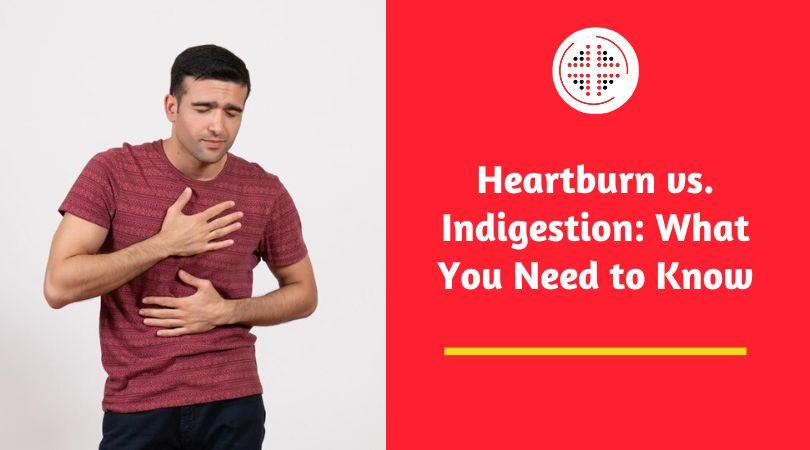Have you ever felt uncomfortable after a meal, wondering if it's heartburn or indigestion? You are not alone. Many people struggle with digestive problems, and understanding the difference can make a world of difference. According to recent research by the American Gastroenterological Association (AGA), approximately 40% of Americans have experienced disruptions in their daily activities due to uncomfortable bowel symptoms.
This article will help you understand the causes, symptoms, and treatments for heartburn and indigestion.
Understanding Heartburn and Indigestion
Heartburn and indigestion are commonly mixed up, although they are different. Heartburn is a symptom of acid reflux, where stomach acid flows back into the esophagus, causing a burning sensation in the chest. On the other hand, indigestion, also known as dyspepsia, refers to discomfort or pain in the stomach that can be accompanied by bloating, burping, or nausea.
Heartburn can often be triggered by specific foods, such as spicy or acidic ones, while indigestion can result from overeating, consuming fatty or oily foods, or eating too quickly. Understanding the different aspects of each condition is essential for effective management.
Symptoms of Heartburn vs. Indigestion
Heartburn and indigestion share some symptoms, making it challenging to differentiate between them. The key distinction lies in the location and nature of the discomfort. Heartburn typically manifests as a burning sensation in the chest, often radiating to the throat. In contrast, indigestion presents as general discomfort or pain in the stomach area. Here's a quick comparison chart to show the differences:
|
Symptom
|
Heartburn
|
Indigestion
|
|
Burning sensation
|
Yes, in the chest
|
No, in the stomach
|
|
Location of discomfort
|
Chest and throat
|
Stomach area
|
|
Additional symptoms
|
Regurgitation, acidic taste
|
Bloating, belching, nausea
|
Causes of Heartburn vs. Indigestion
Understanding what causes heartburn and indigestion can help manage these digestive discomforts effectively.
Causes of Heartburn:
- Heartburn often occurs when stomach acid flows back into the esophagus, causing a burning sensation.
- Spicy or fatty foods, caffeine, alcohol, large meals, and lying down after eating can trigger heartburn.
- Being overweight or pregnant may increase the likelihood of experiencing heartburn.
Causes of Indigestion:
- Indigestion may result from overeating, consuming fatty or greasy foods, or eating too quickly.
- Stress, anxiety, and emotional factors can contribute to indigestion.
- Certain medications, like antibiotics or pain relievers, may cause indigestion.
- Underlying medical conditions such as GERD, gastritis, or peptic ulcers may lead to chronic indigestion.
Over-the-Counter Medications for Treating Heartburn and Indigestion
Both heartburn and indigestion can be treated with over-the-counter (OTC) products. Here are some options:
- Antacids: Ideal for mild, occasional heartburn, antacids neutralize stomach acid. Take them as soon as symptoms arise or before consuming trigger foods. Avoid daily use unless advised by a doctor to prevent gastrointestinal upset.
- Proton Pump Inhibitors (PPIs): PPIs reduce stomach acid for long-term treatment, promoting healing in the esophagus.
- Histamine-H2-Receptor Antagonists (H2 Blockers): While not as potent as PPIs, H2 blockers also decrease stomach acid, relieving both heartburn and indigestion.
Simple Tips for Preventing Heartburn and Indigestion
To avoid the discomfort of heartburn and indigestion, try these easy steps:
- Manage Your Diet: Identify trigger foods and limit spicy, fatty, or acidic choices. Opt for smaller, more frequent meals to prevent overeating.
- Stay Upright: After eating, stay upright for at least two hours to minimize the risk of acid reflux.
- Mindful Eating: Eat slowly, chew thoroughly, and enjoy your meals in a calm environment to aid digestion.
- Maintain a Healthy Weight: Excess weight can contribute to heartburn and indigestion. Adopting a healthy lifestyle can make a significant difference.
- Loose Clothing: Avoid tight belts or waistbands that can put pressure on your stomach, potentially causing discomfort.
- Quit Smoking: Smoking weakens the lower esophageal sphincter, increasing the likelihood of acid reflux.
- Limit Alcohol and Caffeine: Both can contribute to digestive issues, so moderate your intake.
By incorporating these simple practices into your routine, you can take proactive steps to prevent heartburn and indigestion.
When Should You See a Doctor for Heartburn and Indigestion?
Home remedies and over-the-counter treatments might do the trick for mild or occasional heartburn and indigestion. However, if lifestyle changes and OTC solutions don't bring relief, it's time to contact a doctor.
Contact a healthcare professional if:
- Persistent Symptoms: If heartburn lingers or if there's suspicion of GERD (gastroesophageal reflux disease).
- Concerning Signs: Reach out to a doctor if experiencing chest pain, loss of appetite, difficulty swallowing, frequent vomiting, vomit resembling coffee grounds or containing blood, blood in stools, black/tarry stools, or unexplained weight loss.
- Emergency Situations: Seek immediate medical attention for sudden, sharp abdominal pain, difficulty breathing, sweating, pain spreading to the jaw, neck, or arm, and jaundice (yellowing of the eyes or skin).
Get Effective Relief for Heartburn and Indigestion at MI Express Urgent Care!
At MI Express Urgent Care, we specialize in providing immediate relief for heartburn and indigestion. Our experienced doctors offer personalized treatment plans to help you regain comfort and improve your quality of life. Contact us today for the proper care you need to address your digestive discomfort and get back to feeling your best.


